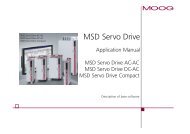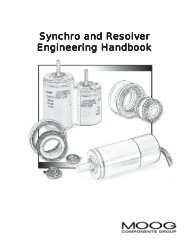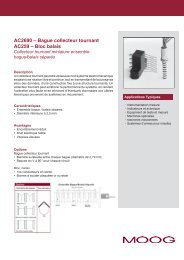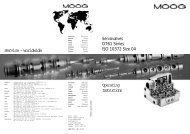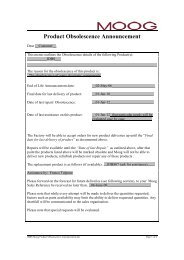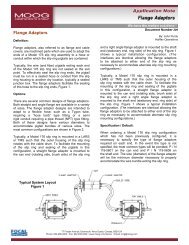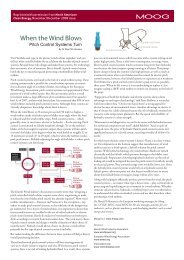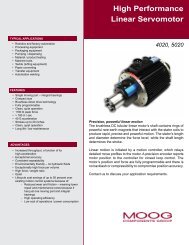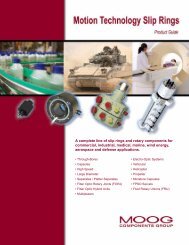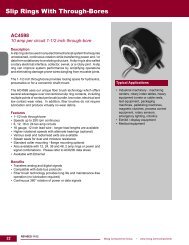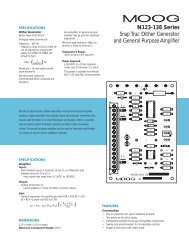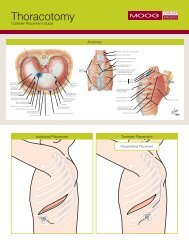Effective Maintenance of Hydraulic Servo Systems
Effective Maintenance of Hydraulic Servo Systems
Effective Maintenance of Hydraulic Servo Systems
You also want an ePaper? Increase the reach of your titles
YUMPU automatically turns print PDFs into web optimized ePapers that Google loves.
EFFECTIVE MAINTENANCE<br />
OF HYDRAULIC SERVO SYSTEMS<br />
A TWO DAY COURSE TO HELP YOU<br />
ELIMINATE EXPENSIVE DOWN TIME AND<br />
REPAIR COSTS IN YOUR HYDRAULIC PLANT<br />
The downtime <strong>of</strong> machinery causes delays<br />
which has implications on customers, costs<br />
and <strong>of</strong>ten can be traced to simple causes<br />
such as contaminated fluids. Moog<br />
estimates that the root cause <strong>of</strong> 90% <strong>of</strong><br />
their servo valve repairs is due to poor<br />
system maintenance.<br />
Moog and the National Fluid Power Centre<br />
have formed a pr<strong>of</strong>essional training<br />
partnership to provide hands-on training<br />
for those involved in the maintenance <strong>of</strong><br />
servo controlled systems.<br />
About Moog<br />
Moog was the first company to produce<br />
the commercial servovalve and has over<br />
50 years <strong>of</strong> experience on building and<br />
maintaining them to original specification<br />
to retain their efficiency.<br />
About NFPC<br />
The NFPC is recognised by the British<br />
Fluid Power Association, and its hydraulic<br />
training courses are designed for everyone<br />
from non-technical staff through to<br />
personnel that are involved in the<br />
maintenance, management and design<br />
<strong>of</strong> fluid power systems.<br />
WHAT MOVES YOUR WORLD<br />
Why you should attend<br />
• Develop a proactive and effective<br />
maintenance schedule through a<br />
better understanding <strong>of</strong> your system<br />
and its needs.<br />
• Work with confidence on your system<br />
through practical hands-on experience<br />
and advice from the NFPC.<br />
• Dramatically reduce costly breakdowns<br />
by understanding the true significance <strong>of</strong><br />
contamination and learning to control it.<br />
• Protect the safety <strong>of</strong> you and your<br />
colleagues by learning about the<br />
current best practices and legislation<br />
in the industry.<br />
• Increase the reliability <strong>of</strong> your system<br />
by learning how to select the right<br />
components for your system, and<br />
when to replace them.<br />
Who should attend<br />
This course is aimed at those involved<br />
in the maintenance and management <strong>of</strong><br />
fluid power systems involving servo<br />
control and anyone considering<br />
introducing a system to their business.<br />
It is assumed that the learner will have<br />
a basic knowledge <strong>of</strong> fluid systems.<br />
Attendees will receive a comprehensive<br />
set <strong>of</strong> course notes, Moog technical<br />
literature and Certificate <strong>of</strong> Attendance.<br />
Course Duration: 2 days<br />
Dates/Location<br />
23 & 24 June 2009<br />
22 & 23 September 2009<br />
15 & 16 December 2009<br />
All courses will be delivered at the<br />
NFPC, Carlton Road, Worksop<br />
Nottinghamshire S81 7HP<br />
www.nfpc.co.uk<br />
Cost per candidate: £725 + Vat<br />
Contact<br />
Caroline Sheppard<br />
+ 44 (0)1684 278369<br />
or<br />
Mark Greenway<br />
+ 44 (0)1684 278223<br />
Email: training.uk@moog.com
Course Outline<br />
The Real Hard Facts about<br />
Contamination<br />
• Acquire the real hard facts<br />
associated with ingression such as<br />
percentage failures and costs likely<br />
to be incurred.<br />
The Business Benefits <strong>of</strong><br />
Good <strong>Maintenance</strong><br />
• Understand the business benefits<br />
<strong>of</strong> good maintenance, such as<br />
performance, availability, services<br />
and costs, and become aware <strong>of</strong><br />
what constitutes a good<br />
maintenance routine.<br />
Most Common <strong>Maintenance</strong> Issues<br />
• Learn about the most common<br />
maintenance issues by focussing<br />
on staff knowledge, their skills<br />
and competence.<br />
• Value the importance <strong>of</strong><br />
contamination control and apply<br />
the control procedures associated<br />
with all maintenance operations.<br />
• Know the effects <strong>of</strong> poor<br />
maintenance on system and<br />
component performance, and the<br />
results <strong>of</strong> failing to adhere to<br />
manufacturer's recommendations.<br />
The Origin and Nature <strong>of</strong><br />
Contaminants<br />
• Gain knowledge about the origin<br />
and nature <strong>of</strong> contaminants, such<br />
as what they are, where they come<br />
from and what actions can be taken<br />
to reduce ingression.<br />
For more information about us visit<br />
www.moog.co.uk/industrial<br />
© 2009 Moog Industrial All rights reserved. For legal notices,<br />
see moog.com/disclaimers.<br />
The Effects <strong>of</strong> Contamination<br />
• Understand the effects <strong>of</strong><br />
contamination on hydraulic fluid<br />
such as performance and life, and<br />
understand how micronic size can<br />
affect component performance<br />
ranging from catastrophic failure<br />
to internal wear, leakage, heat<br />
generation and poor performance.<br />
• Learn about valve sensitivity in<br />
servo and industrial valves and how<br />
it affects performance.<br />
• Become acquainted with the<br />
golden rules for reliable servo<br />
systems, and learn when to replace<br />
components.<br />
The Benefits <strong>of</strong> Using the Right Oil<br />
• Recognise the value <strong>of</strong> using<br />
the right oil and understand its<br />
characteristics and performance <strong>of</strong><br />
the oil in use, and the importance<br />
<strong>of</strong> good oil storage and transfer<br />
procedures.<br />
The Importance <strong>of</strong> Oil Cleanliness<br />
• Review manufacturer's and BFPA<br />
guidelines and understand the<br />
importance <strong>of</strong> establishing a<br />
system target cleanliness level<br />
with regard to the requirements<br />
<strong>of</strong> servo valves.<br />
Methods <strong>of</strong> Measuring Fluid<br />
Cleanliness Levels.<br />
• Establish the present cleanliness<br />
levels <strong>of</strong> your system and look<br />
at the methods available with<br />
pros and cons for options for<br />
measurement such as bottle<br />
sample and microscopy, through to<br />
online/<strong>of</strong>fline monitoring systems<br />
and the use <strong>of</strong> APCs.<br />
• Interpret all the standards such as<br />
ISO 4406, NAS 1638 and SAE<br />
4059E and become familiar with<br />
the actions to be taken.<br />
Health and Safety<br />
• Gain valuable knowledge on how to<br />
handle hydraulic fluid and follow<br />
risk assessment pr<strong>of</strong>iles, wearing<br />
the right clothing and following<br />
safe working practices.<br />
The Use <strong>of</strong> filters<br />
• Learn how filters perform, the<br />
types, location and effectiveness,<br />
with reference to the Beta Ratio<br />
and dirt holding capacity.<br />
• Become aware <strong>of</strong> their<br />
performance relating to<br />
differential pressure and bypass or<br />
non bypass, and the action to be<br />
taken to maintain required<br />
cleanliness levels.<br />
The Importance <strong>of</strong> the<br />
Flushing Process<br />
• Become familiar with the term<br />
flushing and with reference to<br />
flushing plates, the parts <strong>of</strong> a<br />
system requiring this process.<br />
• Know how the flushing process<br />
is achieved and become familiar<br />
with the basic formula used by<br />
engineers to establish flushing<br />
flow rates.<br />
Course Objectives<br />
On the completion <strong>of</strong> this course<br />
the delegate will have a greater<br />
understanding <strong>of</strong> the:-<br />
• Origins <strong>of</strong> contamination and<br />
actions to be taken to minimise<br />
ingression.<br />
• Factors that affect system and<br />
component performance.<br />
• Symptoms associated with<br />
changes in performance.<br />
• Importance <strong>of</strong> implementing<br />
and maintaining effective<br />
contamination control systems.<br />
• Ability to translate the<br />
relevant data associated with<br />
contamination control.<br />
• Fundamental principles that underpin<br />
the operation <strong>of</strong> all systems.<br />
• Ability to read and interpret<br />
hydraulic circuit diagrams.<br />
• Importance <strong>of</strong> establishing clean<br />
and safe working procedures.<br />
Moog Controls Ltd.<br />
Ashchurch, Tewkesbury,<br />
Glos. GL20 8NA UK<br />
Tel: +44 (0)1684 296600<br />
Fax: +44 (0)1684 296760



